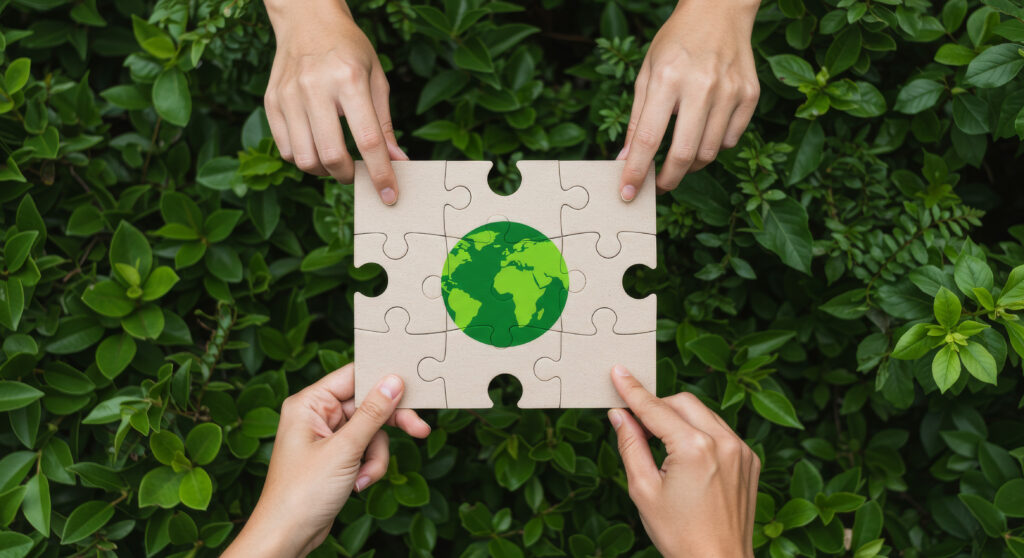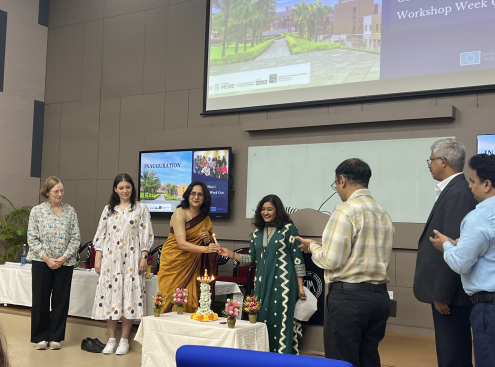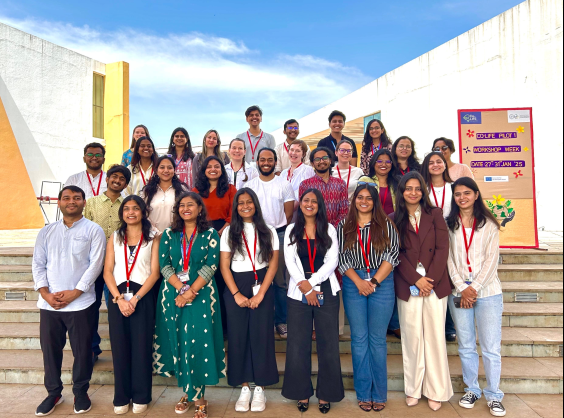Co-Life
Co-designing Learning for Impact-Focused Entrepreneurship, Erasmus+, 1/24–12/26
Three students and one teacher from Laurea’s Future-Oriented Project Management program participated in the pilot of an educational program developed within the Co-Life project in India. The pilot launched in January 2025 in Goa, India. Representing Laurea were teacher Tiina Lehtosaari and students Katja Lajunen, Matilda Pontán, and Tiina Mustonen.

Photo by Vuong / Adobe Stock (Laurea Education-licence)
The pilot course was held at the Goa Institute of Management (GIM) business school in charming Sanquelim. In addition to Laurea, the project included participants from Aarhus University’s Department of Business Development and Technology (Herning, Denmark), Thomas More University of Applied Sciences (Mechelen, Belgium), and LAB University of Applied Sciences (Lahti, Finland). Indian students came from institutions such as the Indian School of Development Management (New Delhi), Art School of Design and Business (Jaipur, Rajasthan), and Ecole Intuit Lab (Mumbai, Maharashtra).
The pilot represents the culmination of three years of development within the Co-Life project (2024–2026), aimed at creating innovative educational materials and approaches to learning about impact-focused entrepreneurship. The project has established a broad ecosystem of eight educational institutions and fostered multicultural relationships between schools, teachers, students, and local businesses and NGOs.
The goal of Co-Life is to enhance the impact skills of students in Indian higher education through design thinking and active co-creation. Local Indian organizations and businesses presented real challenges for students to solve and participated in the development process, sharing knowledge and expertise. The outcome was a learning module designed to inspire students to develop sustainable social and economic solutions.
The Co-Life project is expected to generate meaningful changes in Indian communities and organizations, aligning with Erasmus+ CBHE goals by promoting sustainable practices. Companies that have invested in ESG (Environmental, Social, and Governance) factors have proven more resilient during crises, such as the COVID-19 pandemic. The circular economy aims to rethink our use of resources to create a more sustainable and efficient global economy by minimizing waste and maximizing the use of existing materials (Sitra 2022, 32; 37).
Student projects were guided by sustainability, service design, and the double diamond process to reach the most effective and sustainable outcomes. The course focused on an impact-driven approach, aiming to generate meaningful environmental and societal change. Impact-focused entrepreneurship is a strategy that seeks to achieve social or environmental goals while also generating profit (Sitra 2025). Profit is usually expected, but it may be a secondary aim.
Inspiring Speakers at the Co-Life Event
The week in Goa began with an official opening ceremony. The event was opened by the rector of the Goa Institute of Management, with student musical performances and inspiring talks from various educational institutions. Students were reminded that future leaders must believe in responsibility to drive change. The event culminated in a traditional Indian candle-lighting ceremony.
The midweek International Roundtable Conference featured talks that sparked interest in impact-driven entrepreneurship and responsible transitions. Panelists represented government, associations, businesses, academia, and innovation. They included Soren Tranberg Hansen (Head of Innovation, Danish Embassy), Nitin Kunkolienker (Chair, MAIT), Ravi Sreedharan (Founder & Director, ISDM), Wilma Rodrigues (Founder & CTO, Saahas Zero Waste), and Pasi Rantanen (Innovation and Strategy Expert, Ikigaia). The session was moderated by Dr. Neeraj Amarnani, Professor of Economics and former Dean at GIM.
In a two-hour discussion, topics such as technological development, poverty, hunger, water distribution, and the circular economy were touched upon. Panelists agreed that real change happens when the three “legs of the stool”—government, business, and social sector—are equally strong. Future businesses must account not only for profits but also for people and the planet. Without a planet, there are neither people nor business. Europe must also include global perspectives to ensure diverse solutions. Possible solutions included legal reforms that support circular economy, multilevel action, and implementable innovations within existing systems.

Figure 1. Opening Ceremony (Matilda Pontan)
Company Visits Sparked Insightful Reflection
The pilot training program included live projects with local IFE (Impact-Focused Entrepreneurship) businesses. Through hands-on, multicultural teamwork, students learned service design and co-creation methods alongside sustainability knowledge. Eye-opening site visits took place at local partner companies, where project teams explored business operations and challenges. Visits included Saahas Zero Waste (waste sorting plant), SaafWater (water quality monitoring), Lila Digital (rainwater harvesting systems), and YIMBY (waste management).
Saahas Zero Waste (SZW) is a certified circular economy enterprise that provides waste management solutions for businesses, governments, international organizations, large waste producers, and consumers. With 400 employees across five cities, the 10-year-old company focuses on connecting people and technology to maximize resource reuse (Saahas Zero Waste 2025).
At the SZW facility specializing in plastic sorting, 17 employees sort seven tons of waste daily by hand. Men handled heavier tasks like pre-treatment and baling, while women manually sorted waste. A pre-sorting drum separated light and heavy materials, which women then sorted by type. Once full, the large bags were baled and stored for recycling. The intense heat and odor in the upper level highlighted the stark contrast in living and working conditions globally and reminded students not to take functioning waste systems for granted.
Co-Life aims to help improve such waste facilities, encourage villages to build similar plants, and motivate people to deliver waste for recycling—closing the circular loop. Currently, the plant does not receive enough waste to run at full capacity.
Matilda and Katja visited a village where their partner company, SaafWater, had installed an IoT-based drinking water quality monitoring system. In India, up to 70% of drinking water is contaminated. SaafWater’s startup technology replaces traditional lab analysis with real-time sensor data, enabling proactive prevention of waterborne diseases, deaths, and environmental damage. Students’ goal is to conduct background research and develop impact metrics to help expand product sales. SaafWater already won the 2021 Call for Code Global Challenge—judged by a panel including former U.S. President Bill Clinton—and earned recognition from India’s Prime Minister. The technology allows real-time analysis of physical, chemical, and biological contamination using limited sensors (SaafWater 2025).
Solving Real Problems Through Co-Creation
The week involved more than just lectures—workshops were held continuously, allowing active participation and concrete influence. Ample time was dedicated to team building, enabling students to get to know one another and adapt to each other’s cultural communication styles.
Saahas Zero Waste presented students with two challenges:
- Developing a recycling measurement system to track how much collected waste is actually recycled and where gaps exist.
- Reducing single-use plastics and changing consumer behavior.
Who within the government is responsible for reducing single-use plastics? What international data could help convince policymakers of the circular economy’s importance? What actions could encourage consumer engagement and change? Background: Goa produces the most single-use plastic waste of any Indian state, largely due to tourism. The “floating population” alone is six million people.

Figure 2. Students Participating in the Goa Pilot (Sanskriti Shukla, 2025)
During the trip, there was also time to enjoy Goa’s beautiful beaches, cozy villages, colorful temples and buildings, waterfalls, and lush surroundings. India’s stunning landscapes, welcoming people, and the well-organized Co-Life experience left a lasting impression. The journey was eye-opening and inspiring; we all have much more to learn about responsibility and co-creation. The pilot continues virtually, with weekly team meetings to advance the projects. It will conclude in Mumbai—India’s largest city—at the end of March 2025, where final outcomes will be presented to companies and mentors.
Sources
The first image in this article (the feature image) is not licensed under CC BY-SA. It has been used in accordance with the terms of the Adobe Stock Education License and may not be reused or redistributed without separate permission.